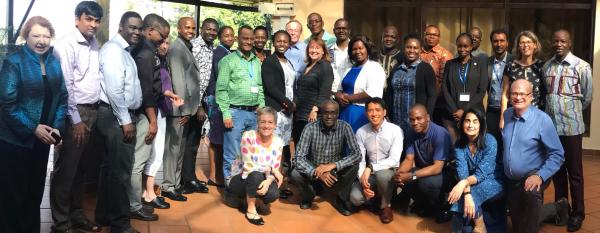Elevating Urban Family Planning Fellowship Programme – Evaluation Report

The IUSSP Fellowship programme for Urban Family Planning (2018-2023) came to an end on 31 August 2023. The programme, funded by a grant from the Bill and Melinda Gates Foundation, and implemented by the IUSSP Panel on Family Planning, Fertility and Urban Development, provided research grants, training and mentoring to early-career fellows in sub-Saharan Africa to carry out policy-relevant research on family planning in urban settings and to engage with urban city planners and policymakers to raise awareness of family planning’s contributions to urban development. Sixteen fellowships were initially awarded, and 12 fellows completed the fellowship programme. (Meet the fellows)
This was the first time an IUSSP scientific panel managed a fellowship and mentoring programme. In addition to capacity building, the programme sought to address the intersectoral divisions between research and policymaking, and the disciplinary divide between family planning and urban planning. Though COVID limited many of the planned in-person activities, fellows and panel members never-the-less participated in a number of meetings and conferences in the areas of family planning, urban health, and local city governance in Africa as well as training workshops on policy communication and engagement. It was a rich, challenging experience for all involved, one that produced numerous academic publications by fellows and panel members as well as reflection on the process of working across sectors and building a cadre of early career professionals. Summaries and reports of these meetings can be found on the Panel’s webpage.
The project identified an important unmet need for training in policy engagement and effectively embedded that training in active research projects. Lessons learned included: an appreciation of the tension between building the research-translation capacity of junior researchers versus the objective of influencing senior policymakers; the need to brief researchers more fully on the new sector with which they are engaging; and the low priority given to interdisciplinary research in African universities. Drawing together fellows from different contexts was highly enriching. The project demonstrated that fellowship projects with research grants and mentorship in both research and policy are an effective way to foster the development of the next generation of leaders in low-income countries.
The panel recently produced an evaluation report of the programme, that includes views and experiences of the research fellows, a summary of project outputs, lessons learned, and recommendations for carrying out capacity building through multi-sectoral and multidisciplinary fellowships, which is available on the IUSSP website.
We thank all those involved at various points in the project including the Panel members, the project coordinator, the fellows, their mentors, and institutional partners, in particular the African Population and Health Research Centre (APHRC), who provided training in policy communication and policy engagement.
|
